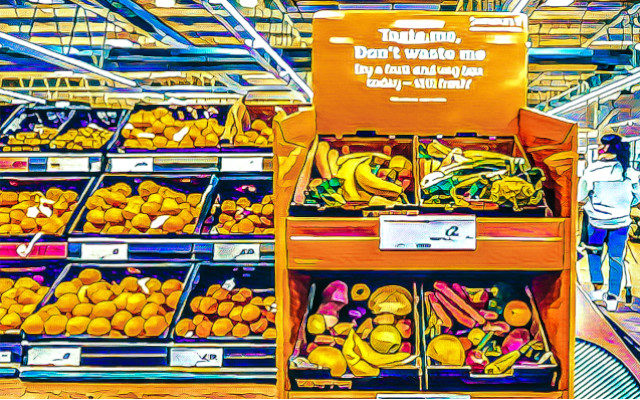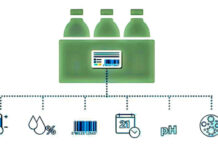‘Taste Me, Don’t Waste Me‘ is the initiative of Sainsbury’s – the second largest retailer in the UK – to combat food waste by putting up £2 boxes of surplus mixed fruit and vegetables for sale in more than 200 stores out of the approximately 2,000. (1)
1) Food waste. #SDG12, Target 12.3
The ‘Taste Me, Don’t Waste Me‘ initiative is part of Sainsbury’s program that aspires to halve food waste by 2030 (see section 5). In line with the appropriate target defined under Sustainable Development Goal No. 12(Responsible Consumption and Production).
‘By 2030, halve per capita global food waste at the retail and consumer levels and reduce food losses along production and supply chains, including post-harvest losses’ (Target 12.3).
The operators more responsible in the industry retail are therefore at the forefront-as also seen in the case of Coop Italia (2)-both in optimizing the management of the supply-chain, both to promote the sale last minute i.e., the distribution of perishable food that is expiring to charities and voluntary associations.
2) Food security, nutritional safety. #SDG3
Each initiative of heavily discounted sales and free redistribution of surplus food simultaneously fulfills a food security goal, in line with SDG 3(End hunger, achieve food security and improved nutrition and promote sustainable agriculture).
Fruits and vegetables moreover contribute to the goal of nutritional security. Of particular relevance in the face of the perma-crisis that has plagued the European continent for three years now, first because of Covid and now because of the dastardly war. To which is added in the UK the Brexit factor. (3)
3) Sainsbury’s £2 fruit and vegetable box, NHS Healthy Start
£2 fruit and vegetable box joins another initiative in which Sainsbury’s is also participating, the coupons of £2 funded by the Department of Health to help low-income families in England, Wales, and Northern Ireland purchase fresh, frozen, and canned fruits and vegetables (NHS Healthy Start). (4)
‘The ‘Taste Me, Don’t Waste Me’ boxes include a variety of surplus fresh fruits and vegetables, and the boxes will be sold at a lower price to help ensure customers have access to affordable nutritious food as the cost of living continues to rise.
We believe that everyone deserves to eat well at an affordable price and we hope that this additional support will ensure that good quality food is not wasted’ (Richard Crampton, Sainsbury’s, Fresh Food director).
4) Inflation, guaranteed first price, ALDI Price match
Sainsbury’s has also pledged to invest £550 million by March 2023 to counter food price inflation without passing the impact onto suppliers. Which – in turn – have suffered and continue to suffer significant price increases in the costs of raw material procurement, processing and packaging, and logistics.
The first price on private labels is secured, by Sainsbury’s as well as national leader Tesco, through real-time comparison with prices charged by discount giant Aldi (5.6). Sainsbury’s Aldi Price Match campaign currently considers the prices of about 300 products, including more than 180 fresh products, including fruits and vegetables, with at least two surveys each week.
5) Food waste, more Sainsbury’s initiatives.
Sainsbury’s food waste reduction program also includes other initiatives, such as the removal of best before date (minimum shelf life), which has already been carried out on more than 100 product lines, mostly fruit and vegetables, and is being carried out on another 130 lines.
6) Areas for improvement
‘At Sainsbury’s we are committed to helping our customers access tasty and nutritious foods that are better for them and also better for the planet.’ (Richard Crampton, Sainsbury’s).
The best foods for the health of people and the planet-because they are made without dangerous pesticides that intoxicate organisms and ecosystems (6,7,8,9,10)-are organic products.
Supporting the purchase of the best foods for all should therefore first and foremost encourage the production and consumption of organic foods, which are themselves weakened by inflation. (11)
#wasteless!
Dario Dongo
Notes
(1) Sainsbury’s rolls out £2 ‘Taste Me, Don’t Waste Me’ fruit and veg boxes to help reduce food. https://www. about.sainsburys.co.uk/news/latest-news/2023/20-02-2023-sainsburys-rolls-out-taste-me-dont-waste-me-boxes Sainsbury’ s. 20.2.23
(2) Dario Dongo, Giulia Pietrollini. Reducing food waste, Coop Italia’s strategy. GIFT (Great Italian Food Trade). 21.2.23
(3) Poppy, G.M., Baverstock-Poppy, J.J. & Baverstock, J. Trade and dietary preferences can determine micronutrient security in the United Kingdom. Nat Food 3, 512-522 (2022). https://doi.org/10.1038/s43016-022-00538-3
(4) The Healthy Start card also provides the opportunity to purchase milk, legumes, milk-based infant formulas, and vitamins for pregnant women and children up to 4 years of age. V. https://www.healthystart.nhs.uk
(5) Sainsbury’s. Aldi Price Match https://bit.ly/3kyEnu2
(6) Tesco. Aldi Price Match https://www.tesco.com/groceries/en-GB/zone/aldi-price-match?preservedReferrer=
(7) Dario Dongo. Pesticides and the microbiome, interview with Prof. Alberto Mantovani. GIFT (Great Italian Food Trade). 22.5.19
(8) Marta Strinati, Dario Dongo. The organic diet rids the body of glyphosate in a few days. Scientific study. GIFT (Great Italian Food Trade). 25.8.20
(9) Dario Dongo, Andrea Adelmo Della Penna. Organic foods and the immune system, scientific evidence. GIFT (Great Italian Food Trade). 11.4.20
(10) Elena Bosani. Organic diet and few pollutants to protect children’s cognitive system. The Human Early-Life Exposome Study. GIFT (Great Italian Food Trade). 23.7.22
(11) Marta Strinati. Organic, slower but inexorable growth. FiBL and IFOAM’s 2023 Report.. GIFT (Great Italian Food Trade). 23.2.23
Dario Dongo, lawyer and journalist, PhD in international food law, founder of WIISE (FARE - GIFT - Food Times) and Égalité.








